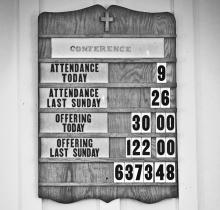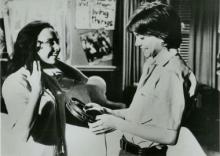sunday mornings

At a church I used to serve there was a well-intentioned person who after every service would tell me how many people were in attendance. “We had 47 today, Preacher,” he would say. I could hear the disappointment in his voice when he would have to tell me a low number like 35. A smile beamed across his face when we had more than 50. No matter the number, he would tell me without fail.
In every church that I have ever visited or served there has been an emphasis on the number of people that attend the morning worship services.
After years in the ministry, I have come to the conclusion that the church needs to stop taking attendance — immediately.
For many churches the process of collecting attendance is to get an accurate account of people in worship, to measure how many people occupy space in a pew. Some churches have notepads in the pews so people can fill out their information and place it in a designated area. Others have a volunteer to manually count the people in attendance. No matter how small or big the faith community is, an attendance is taken. Some congregations publish the number of people in their church bulletins or have it on a sign in the sanctuary to compare last week to this week.
For too long churches have measured their ‘success’ and ‘failures’ on the number of people that darken the door on 11 a.m. on Sunday morning. The quickest way to get people to wring their hands in worry is to tell them that numbers in worship have dropped. Visions of the church closing its doors will run through people’s minds inciting more and more anxiety.
It’s no secret that the church in the American culture is not where most Christians would like it to be. The church that was once the central hub of the community is now a place where a subset of people goes on Sunday mornings. The church has been in a decline for some time, and I believe this has caused us to become more inward focused. As the church began to experience decline numerically, the church’s reaction was to try making everyone left happy — from the ministers and worship leaders to the custodial staff. The boat was not rocked, things stayed the same, a course was laid, and no deviation would be acceptable.

The little daughter, though, is as enchanted by the white boy as much as he is as annoyed by her, and speaks to him cheerfully despite his laconic responses.
It is she who is the catalyst for the plot’s action: Just as the boy is being ever more sucked into bad company and down the wrong road, something happens to the little girl. Either she’s hit by a car, or threatened by the (white) thugs he’s been hanging out with—of this, I have no memory.
What I do remember is, at the moment the little girl is hurt, the dormant moral impulses of the white boy spring into action. Finally, he sees in the girl a fellow human being, and in that moment becomes one himself.
He holds her in a stark reverse pietà that is burned into my memory: when the girl is saved, he, too is saved, and he and she both return home, to the home that is now, in spiritual truth, both theirs.
I’ve scoured this story in my memory for years—is it just another representative of a “Magic Negro” narrative? Yes—but even by dint of sophisticated analysis, the story continues to yield up its power to me. It made me want the racial chasm all around me to be healed, but even more (I identified, you see, with that angry white teenaged boy), it convinced me of the reality of sin, my need to be redeemed.
And it also convinced me of the reality of mysterious, unexpected grace.
Unexpected grace was exactly what I found when at last, at the age of 43, I decided to go searching for that program, and that episode.
A recent U.S. Court of Appeals ruling, and the subsequent fallout here in New York, hits close to home for many of us New Yorkers. The ruling, which came down on June 2, allows for the city of New York to restrict religious groups from meeting in schools